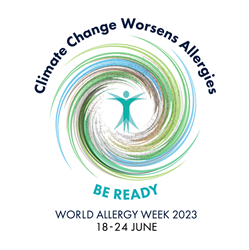
Specialists such as allergy/clinical immunology physicians can help their patients identify triggers, prevent worsening of symptoms, and maintain quality of life amidst changes in their environments.
MILWAUKEE (PRWEB)
June 18, 2023
World Allergy Organization (WAO), serving its membership of professional allergy/immunology societies around the world, launches World Allergy Week, from June 18 to 24 June. People with chronic allergic diseases and asthma have increased susceptibility to the effects of climate change.
Rising temperatures, warming oceans, rising sea levels, and accelerated melting of glaciers are some of the known measurable effects of climate change, along with intense droughts, increased air pollution, water scarcity, earlier and more intense pollen seasons, severe fires, flooding, catastrophic storms, and declining biodiversity.
People with allergies and asthma are susceptible to these effects of climate change and must frequently adapt their health care as well as aspects of their daily lives. It is essential that health care practitioners also adapt and find new approaches for managing allergies and asthma with consideration of changing climates and environments.
The most common chronic diseases in humans are allergic airway diseases of the respiratory system. Asthma affects over 350 million people worldwide, and allergic rhinitis affects between 10% and 50% of the population, depending on geographic location.
Specialists such as allergy/clinical immunology physicians can help their patients identify triggers, prevent worsening of symptoms, and maintain quality of life amidst changes in their environments. They can give proper advice to their patients as well as policymakers on how to face this growing concern.
Beyond the clinic, mitigating the effects of global warming will help prevent new or worsening allergies and symptoms. Improving air quality will decrease respiratory allergy suffering. Protecting and expanding biodiversity can help us protect our bodies. Learning and understanding the relationship between nature and people can improve health for all.
In upcoming webinar presentations, international experts will identify current, major effects of climate change. They will explain how these changes increase allergen exposures and make allergy patients susceptible to worsening symptoms. They will suggest ways that the allergy/clinical immunology specialist can help patients adapt and maintain health in changing environments.
WAO will host the webinar, “Climate Change Worsens Allergies: Be Ready”, on June 20, 2023, at 8:00 a.m. EDT (New York) with a live question-and-answer session. Click here to search for your corresponding local time: https://www.timeanddate.com/worldclock/converter.html?iso=20230619T120000&p1=179. Learn more and register for the webinar at http://www.worldallergyweek.org.
To find a professional allergy/immunology member society of WAO in your country or region, visit http://www.worldallergy.org/about-wao/member-societies.
__________
About the World Allergy Organization
The World Allergy Organization (WAO) is an international alliance of 108 regional and national allergy, asthma and immunology societies. Through collaboration with its Member Societies WAO provides a wide range of educational and outreach programs, symposia, and lectureships to allergists/immunologists around the world and conducts initiatives related to clinical practice, service provision, and training in order to understand and address the challenges facing allergists/immunologists worldwide. (http://www.worldallergy.org)
Share article on social media or email:

